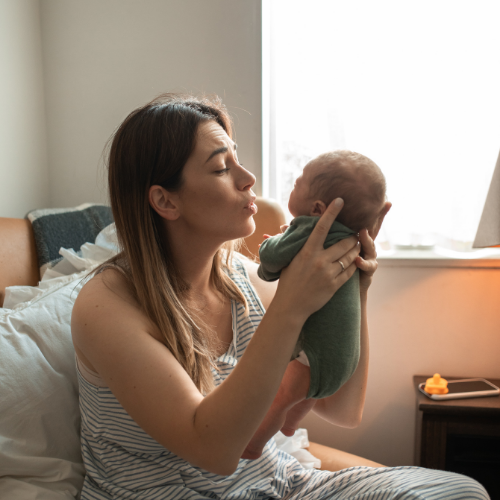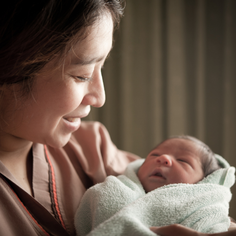The development of circadian rhythms and sleep cycles Newborns do not produce their own melatonin, although human breastmilk does contain tryptophan – the precursor to melatonin. Newborns also do not have a predictable, consolidated or reliable napping pattern. Newborns have short sleep cycles of about 30-40 minutes, and spend most of this time in dream sleep. Dream sleep seems to be important for brain development. In fact, the blood flow to the brain almost doubles during dream sleep. For parents, this means a baby that wakes very easily, specially when placed down in the cot or other sleep surface as dream sleep is lighter sleep. In general, achieving more quiet sleep is indicative of brain maturity, with preterm babies spending a great deal of time in dream sleep. So, more mature babies spend less time in dream sleep and more time in quiet, deep sleep. There are other factors that will influence how your baby sleeps in the early days and weeks related to what happened in birth and the mother’s habits in late pregnancy. But we often have very limited control over these.
need to feed frequently, either by breastmilk or formula. Reach out for support if you need. Use this time to build the bond by maintaining eye contact during feeds – Feeding and eating is a lot more than a ‘task’, it is relational. ‘Talk’ to your baby - When your baby is not feeding but alert, to copy your baby’s facial expressions, interact with your infant. This is the earliest form of communication. Your baby will often stick their tongue out when that action is modelled to them, or make attempts to use facial expressions to respond to noises that you make. Create a ‘day and night’ routine - The day-night rhythms of a newborn are often described as being ‘all over the place’. This will settle down once your baby has established their circadian rhythmicity. This can be sped up by the exposure to broad spectrum daylight for 12 hours per day, with normal activity levels during the day, normal amounts of noise and light, and then a 12-hour period of dark, quiet and reduced stimulation. Some strategies that might help to optimise newborn sleep are listed below:
Practical Tips
And of course - remember to enjoy the crazy early weeks!
0 Comments
|
About meI’m Karina and I’m the founder of Calm Sleep and I help sleep deprived parents achieve better sleep using a caring and holistic approach that takes a broad view of children's needs. I offer an alternative to traditional sleep training Archives
October 2021
Categories |
Proudly powered by Weebly



 RSS Feed
RSS Feed